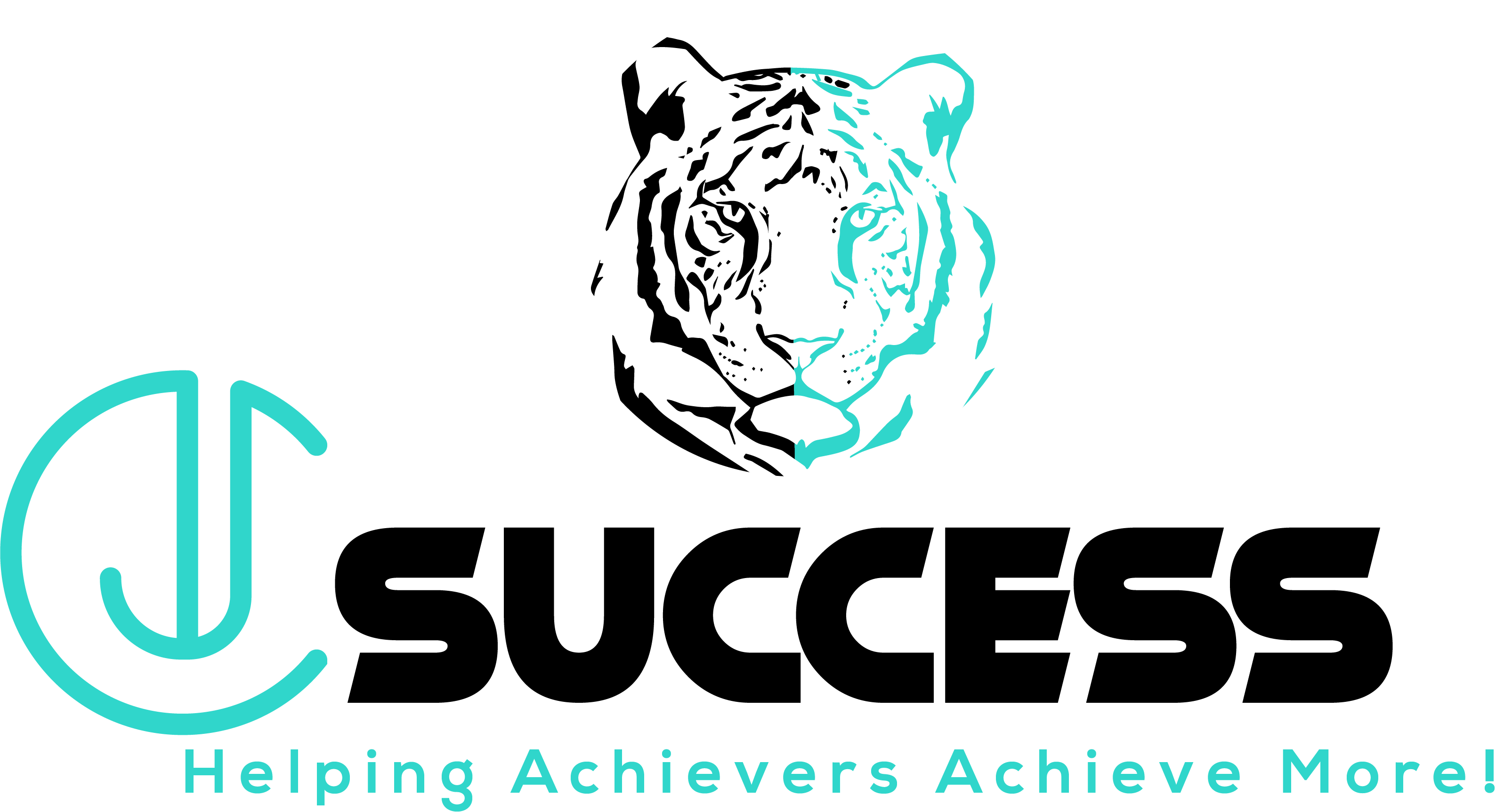0
+
Add your comment
UPCOMING EVENTS
Special opportunity!
1 To 1 Public Speaking Coaching And Group Workshops With Your Team
July 26-Aug 15, NY/NJ area
Hosted By: Eliezer Blatt
For info, email Eliezer Blatt
1 To 1 Public Speaking Coaching And Group Workshops With Your Team
July 26-Aug 15, NY/NJ area
Hosted By: Eliezer Blatt
For info, email Eliezer Blatt
No event found!
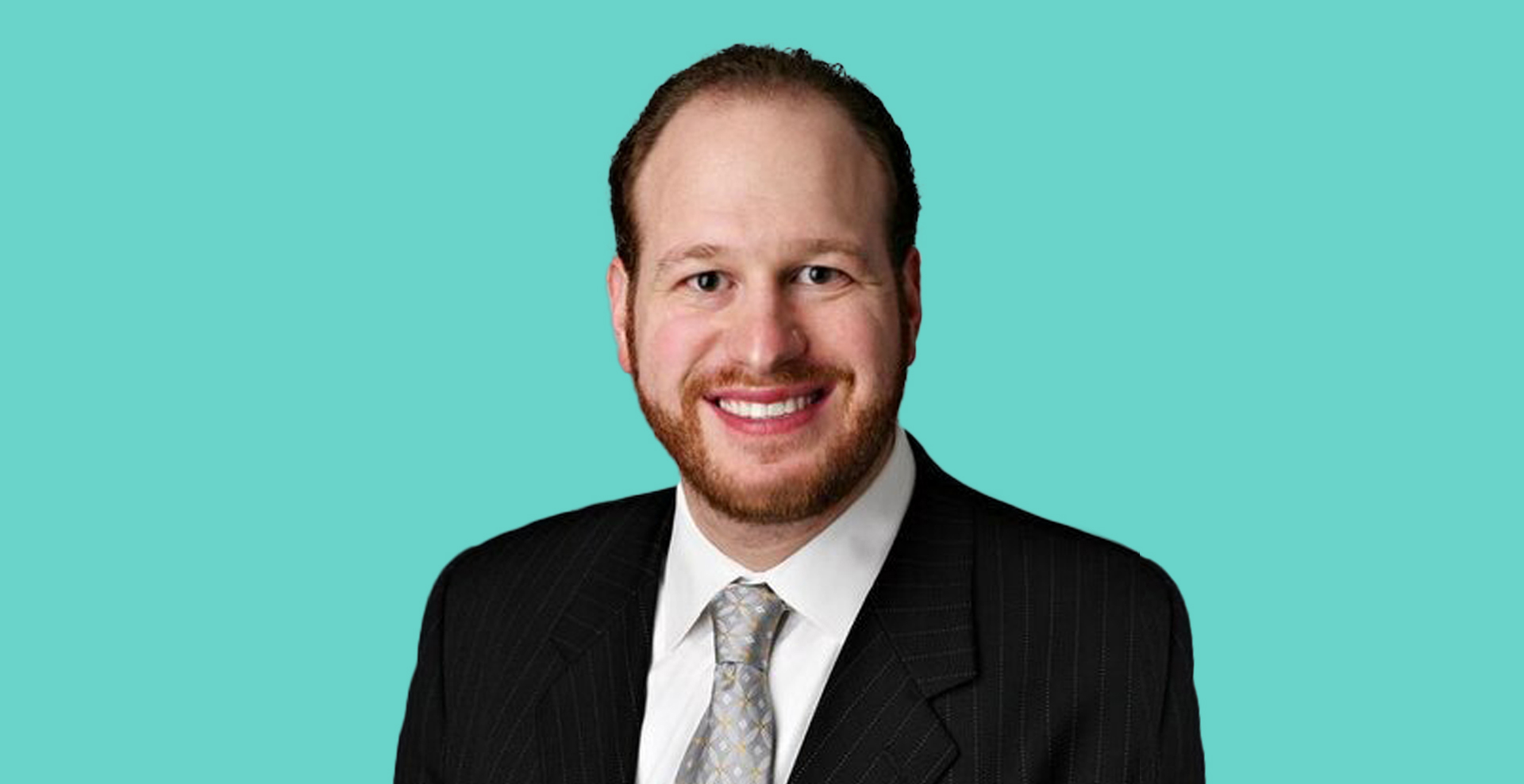
Interview with David G. Greenfield, CEO, Met Council & former New York City Council Member
November 6, 2023
by Zevy Lamm - Founder, J Success, LLC
Dear JSuccess members,
This month we have the privilege to interview David G. Greenfield, CEO, Met Council!
David Greenfield is the Chief Executive Officer and Executive Director of Met Council. He is an accomplished legislator, popular law professor, and noted media personality with broad experience in government and not-for-profit organizations. As CEO and Executive Director, David has expanded Met Council’s mission and services to help over 325,000 New Yorkers in need each year through a multitude of direct services and policy advocacy. For David’s full bio, click here.
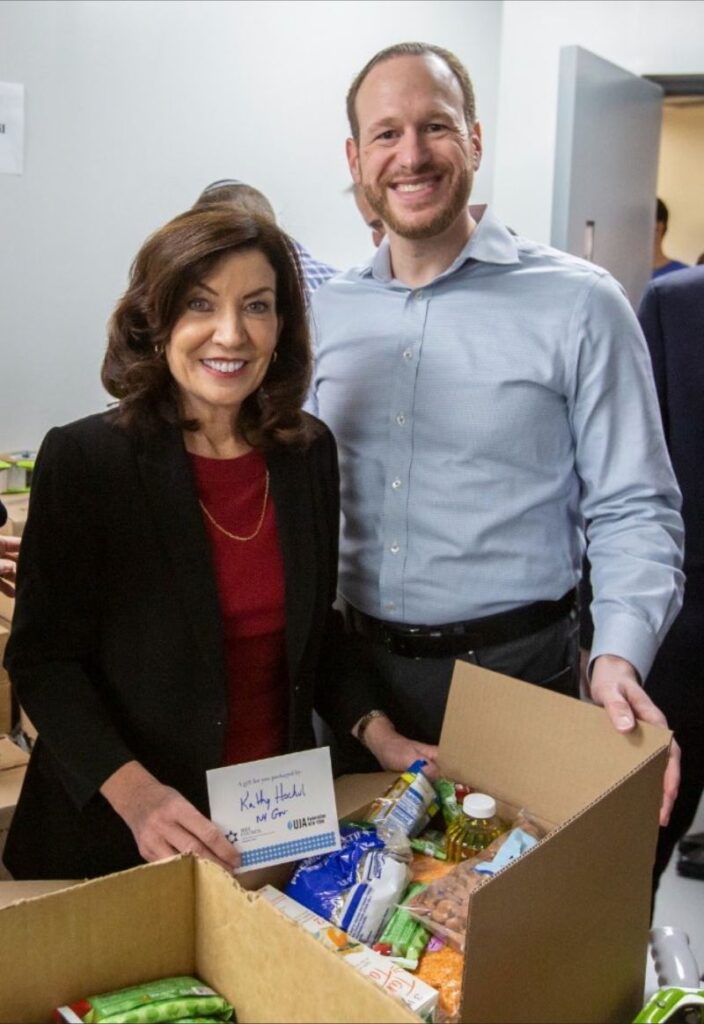
David has received numerous commendations and recognition for his work as a civic and non-profit leader. He was ranked as the 51st most powerful New Yorker in City & State's Power 100 list in 2014, ranking him one slot behind billionaire political George Soros, and in 2021 he rose to the 14th spot on the list—in a city of 8.8 million residents! He was also recognized by City & State as among the top ten most influential residents of Brooklyn—NYC’s most populous borough, with over 2.7 million residents!
On a personal note, I had the unique privilege of sharing the stage with David at the JCON Real Estate Summit in May of last year and I appreciated his candid “kick under the table” to shorten my answers on the panel!
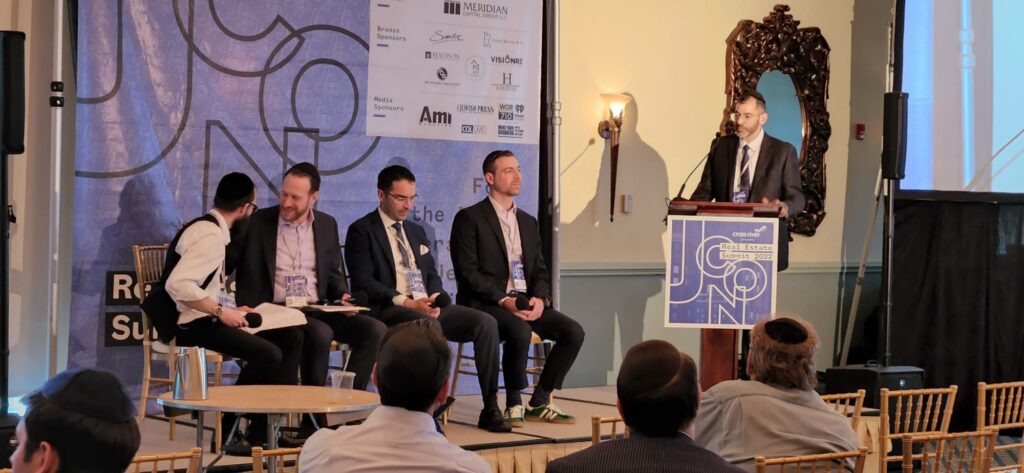
As many of you know—especially if you’re from the NYC Tristate area—David is one of the most accomplished legislators and media personalities of our time! What David and has done over the past 2 decades for Brooklyn and beyond is an inspiration to our global Jewish community of business leaders as to what one individual can accomplish!
Wow! Quite a lot for one person to accomplish!
Good morning, David.
Good morning. How are you?
Baruch Hashem, and yourself?
Doing well. Baruch Hashem. How’s it going? How’s business?
Baruch Hashem, we’re very busy and looking to make a bigger impact in our industry. We recently launched JSuccess, a hub for personal development for the global Jewish business community. I’d love to dive right in and I’m hoping that you could help us by being a little bit more vulnerable here, if you will. It’s different than a typical interview. I’m hoping you’ll be open to sharing; getting a little bit more personal.
Well, let’s see how it evolves. So what’s going on? I’m happy to chat. I remember it was great schmoozing with you on the panel [at the JCON NYC Real Estate Summit]. I thought you were terrific last year, and I’m certainly happy to catch up. So talk to me, what’s on your mind?
Thank you! So let’s just jump in. We all witnessed your impassioned denouncements regarding anti-semitism and the Holocaust. I remember one particular powerful, impromptu moment in January of 2015. It was on the floor of the city council. I watched that video a couple of times. On a personal level, what does the Holocaust and anti-semitism mean to you?
Slamming “naked, blind antisemitism” at NYC Council discussion of the 70th anniversary of the liberation of Auschwitz which went viral with 10’s of millions of views
This happened nearly ten years ago, but it was the first time where we saw the very far left stand up and openly protesting the Holocaust, Jews and Israel in City Hall. They were yelling and screaming anti-Israel statements while we were commemorating the Holocaust. I gave an impromptu speech that went viral that got tens of millions of views. And I think what’s important about that, and as it relates to the focus that your readers are aiming for, is that a lot of people look at these things and they’re like, oh, okay, well, something like that just happens. I really believe that it is the result of things that come together. Obviously, we all believe things are bashert, but these things that come together, they’re not accidents. It’s a question of your whole life that has been leading up to that moment.
So, meaning, if you bump into someone in a hotel lobby or on a plane or on a trip or in a restaurant, obviously it’s bashert for sure. But it’s not just that it’s bashert. It’s also a matter of everything that you’ve done up until that point which allows you to be there, to pitch it successfully, to interact with someone successfully, to communicate with them.
I think it was the same thing over here. Reflecting on the moment; it’s like people ask, how do you go viral? Answer is, no one really knows how to go viral. People spend millions of dollars and they have teams of people trying to help them.
I think a lot of people don’t know this, but influencers actually have literally teams of people who follow them around. I recently saw a Jewish influencer who had a whole video crew following them around and editing post-production. So these things don’t go viral on their own.
The key lesson here is that I don’t buy the stories that say I randomly walked into a place and bumped into someone and pitched them a random idea and became a millionaire.I don’t think that works. I don’t think it makes sense. I think that the more you work and the more you become an expert at something, the more natural it becomes and effortless it becomes.
So I had spent, up until that point, 17 years of my life publicly speaking. I had spent 17 years of my life working on issues that I care strongly about, including fighting for the Jewish community, denouncing anti-semitism, respecting Holocaust survivors and commemorating the Holocaust, and improving the overall state of the Jewish community in New York.
And so I think that all of that came together and created that moment.
And when your moment comes, you’ll be ready, because you’ve worked on it for a very long time.
Wow. I love that you said 17 years led up to that moment. What was before that? Meaning; obviously, you and I, we all have similar backgrounds as far as the Holocaust and anti-semitism. What made it a personal issue for you? Or was there something that made it personal? I believe the reason that made it viral is more than the public speaking skill and the concern for the community and for Israel and world peace; I think there was… a lot of it seemed to be a personal pain that resonated with people.
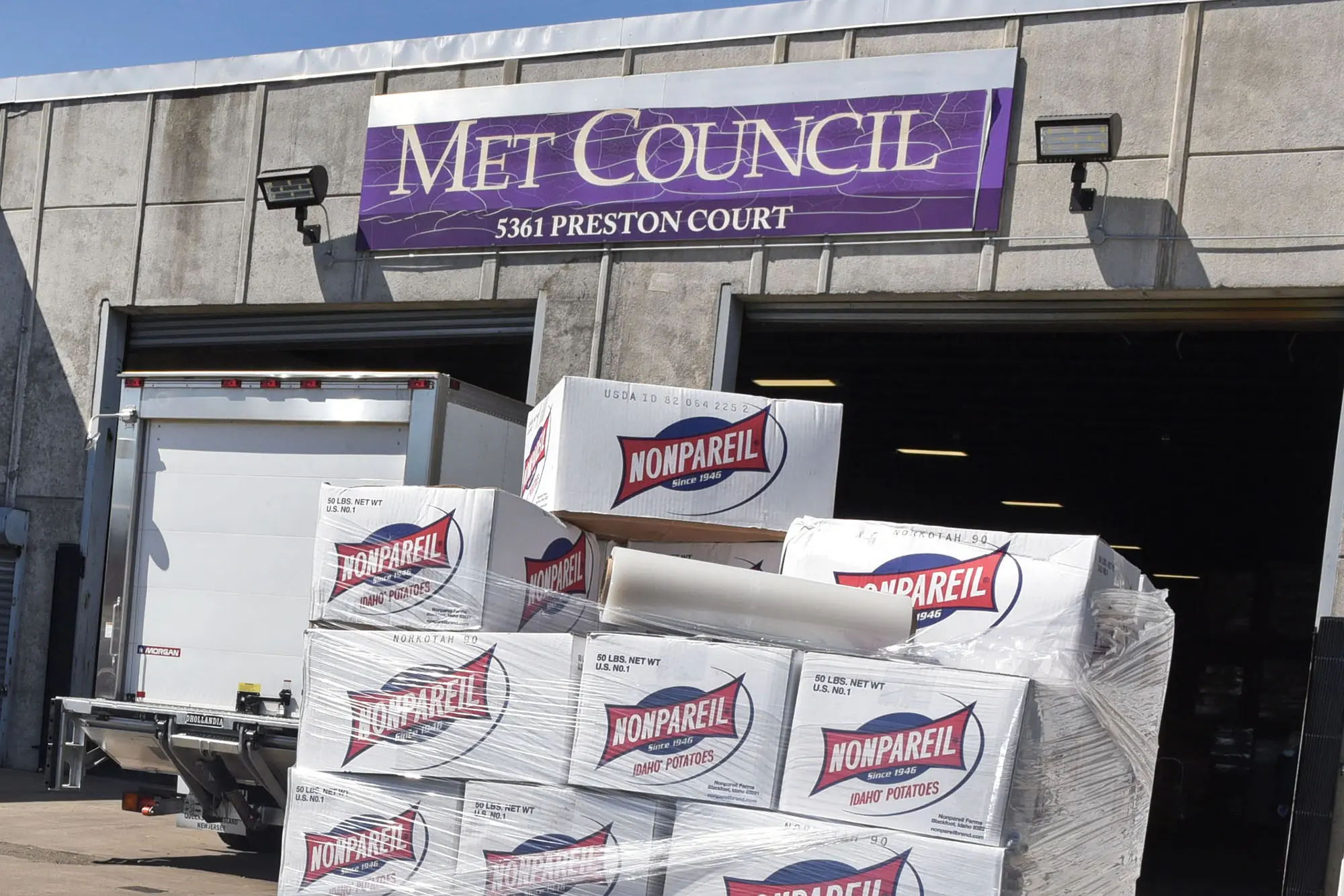 Uber and the nonprofit Met Council are joining forces to deliver 500 Passover meals to homebound Holocaust survivors who will be isolated.
Uber and the nonprofit Met Council are joining forces to deliver 500 Passover meals to homebound Holocaust survivors who will be isolated.
So you know, my grandparents were Holocaust survivors. A lot of my family was wiped out in the Holocaust. The reason my grandfather survived was because he had assumed the identity of a Christian teenager who had died,—and he had spent the Holocaust actually traveling through Nazi countries as an assumed Christian “priest.”
And so that’s actually what allowed him to go through that. Actually a few years back, I was in a hotel in Florida speaking at a kosher program and somebody came over to me, and says, “Your father saved my life in the Holocaust”. And I was like, “I doubt that it’s my father, but maybe you’re referring to my grandfather”. And I asked him the story and he told me that he was a kid when the Holocaust broke out. They were living in the sewers and my grandfather had come as a priest. He had access to the streets, and under his long flowing robes, he would deliver food and supplies to people who were living literally underground in the sewers.
This guy was telling me, “We had it so good because of your grandfather. Not only did he give us food and water, but he even gave us toothbrush and toothpaste and we were able to brush our teeth while we’re there”. So I asked my grandfather about it. He didn’t really want to talk about it. It’s trauma for them, you know. But I said, “Look, it’s a tremendous thing, an amazing zechus”. “No, David”, he said, “you’re looking at it wrong. I believe the only reason that I survived the Holocaust was because all these people were davening for me every day that I should survive. Because if I didn’t survive then I wouldn’t be able to help them. I think it was in their zechus that I actually survived, and I don’t think I did anything special”. I think that sort of speaks of the selfless generation that was of Holocaust survivors who really gave everything and risked their lives for other people in a way that sadly we don’t see anymore. And yeah, so for me it definitely is personal interacting with Holocaust survivors.
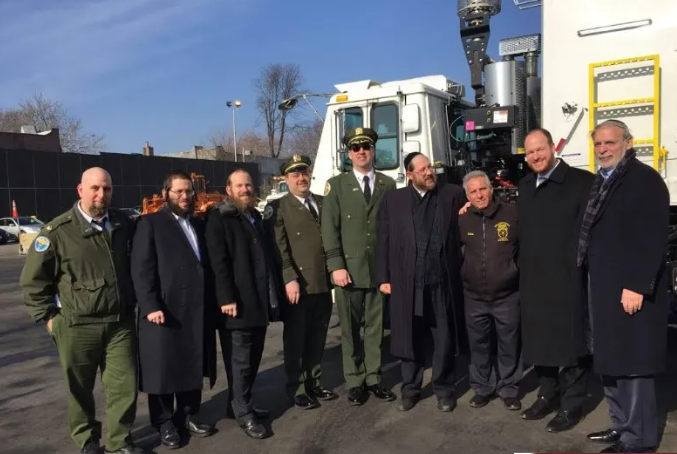 Lauding New Garbage Collection Schedule to Ease Traffic in Borough Park
Lauding New Garbage Collection Schedule to Ease Traffic in Borough Park
And that’s actually why my current work as CEO of my council, one of the four things that we did when I came to Met Council approximately six years ago is we really doubled down on our Holocaust Survivor program. We’ve made it a lot larger and more robust. We now have the largest Holocaust survivor program in New York. And one of the things that we started during the Pandemic is we deliver food directly to the homes of Holocaust survivors. We’re helping over 2,000 Holocaust survivors a month who are getting food directly from Met Council in addition to other services that we’ve done as well to try to ensure the dignity of survivors. Because I think what they went through is sort of unimaginable and unspeakable so much to the extent that they literally would not speak about it because they found it too difficult to speak of. And so I think that while it’s tough for us in our day-to-day life with the challenges that we have; those are not the kinds of challenges that we could ever fathom. And so I certainly think that we have an acharayus to protect and cherish and respect the survivors that are out there.
But at the same time I think that we need to make sure that the memory of what happened isn’t changed. And I think that’s certainly very important. I’ll add that’s why I take groups of public officials and policy influencers and community leaders to Israel. And I always make sure that we spend time not just at Yad Vashem, but we also spend time meeting survivors to hear from them so that people sort of understand the experience that they had. Because I think that’s certainly very important in terms of the work that we try to do on behalf of the community.
Wow. You just shared a lot. And I wish I could delve into each item that you just mentioned, but one of the things that you just said leads me to my next question. I was very inspired by a quote of yours. “I always believe my job and my focus was to help people, and I’m making a difference in the lives of very vulnerable and needy people”. My question to you is, as a child, and now with what you just told me as the background, I definitely understand that with your grandfather risking his life and helping people and bringing them food and toothbrushes and what not, I could definitely see how that probably influenced you. But my question to you is, as a child, what did you want to be when you grew up? I mean, that’s a cliche question, but I still want to ask it.
So the truth is, it’s not that difficult for me. It’s a pretty simple question. I always wanted to be a lawyer. Since I was very young, I was very intent on being a lawyer.
And in my home, I had seen my parents were very involved in chesed. My mother, Sara A”H, actually would always take time to prepare food and deliver it to people in the community who were in need. And after my father, Yisroel A”H, passed away, she actually did it on a larger scale. She was doing hundreds of families a week until she passed away.
My father was someone who people used to come to for help and advice before there was Google and you couldn’t look things up and you had challenges and issues. He was someone who was a businessman and he was involved in a lot of different businesses, and people used to come to him and he spent a lot of his time helping other folks. I’ll never forget this incident at my father’s shiva some 20 years ago. I still remember this, and it stands out. I had someone who came to the shiva and he was a young guy, he was probably around 30 years old.
He was just starting a business and he was crying. And I had never met this guy before in my life and he was crying. He couldn’t even get a word out. And it’s bizarre, right? Because you’re at a shiva for your father. People are supposed to console you. Here I am at the shiva, sitting shiva in Flatbush on Ocean Parkway, and I’m consoling him. Finally, he gets his story out, and he says, “I didn’t know your father was sick”. And I said, “I’m sorry to hear that”. And he says, “No, you don’t understand. I’ve been working with your father for the last six months. I started a new business and a friend of mine introduced me to your father and said he’ll give you good advice. And your father spent dozens of hours helping me and advising me and he didn’t want anything. He just wanted me to be successful”, he said, “I spoke to him last week. Now I realize he was in the hospital, and he was speaking very low. And I asked him, what’s going on? And he said, oh, I’m whispering because I don’t want to make too much noise. He didn’t want me to know that he was sick because he didn’t want me to stop calling him and asking for advice”.
And this is in the last few weeks of my father’s life, he didn’t have the energy to speak, so he spoke in a whisper, right? And so there was someone who I’d never met before in my life who was 30 years old, who was starting a business, and my father had spent countless hours helping out, literally in the last hours.
It’s funny. People ask, what would you do if you knew you were going to die in a month from now or two weeks from now, right? My father was sick, and he knew his time, the end was near. And what he did was he spent his time on the phone helping people he didn’t actually know be successful with their businesses and their lives, right? So certainly that had an impact on me.
I think that for me, I’d always wanted to be a lawyer, because my notion back then of a lawyer was that a lawyer was someone who upheld truth and justice and differentiated right from wrong. And I was very committed to that goal.
A lot of folks sort of ask me, like, what’s your secret? And the answer is, when I believe in something, I just focus on it, and I work very hard. My friends and colleagues and staff will tell you I sleep a few hours a night. I will absolutely work 16, 17, 18 hours a day, 20 hours a day, sometimes.
And because my focus was from a young age that I wanted to be a lawyer, I was very determined to do that. And so I was in yeshiva, and I went to college at the same time. I focused on political science because I thought it would help me be a better lawyer. I graduated from college, I was 19. I was first in my class at Touro College as valedictorian. I went to Georgetown Law School and from there, somewhere along the way—and I think this is also an important lesson for your readers—that somewhere along the way I sort of lost track. Because at law school, what the big hullabaloo in law school is always about is where can you get a big job in a big firm, and make a lot of money.
And I think that’s important. I find summer is a good time to plan. A lot of people think summer is a good time for vacation. I look at it as summer is a good time to plan. So as an aside, and I’ll get back to this in a moment; I recently sat down with my twelve senior staffers at Met Council, which was last week, and I said, okay, I want to create a plan on what we can do that will be more impactful and that will be more efficient and that will ensure that we’re constantly best in class. And I really want to create a strategic plan for the next few years. And one of the things I thought a lot about was how we’re going to create this plan and one of the things I said was we have to make sure that we’re constantly revising the plan and that we’re meeting and making sure that the plan flows from the initial goal of what we wanted to do and we don’t get off track.
And so to get back to my point; I interviewed at a lot of big firms and I got a job at a big firm in New York. To put this in perspective, I graduated in 2001. I was 22 years old and I was making $150,000 a year. That’s a lot of money. And so I was very proud of myself and then my father was niftar and then I remember I was literally on a plane, I was flying to Eretz Yisroel for my father shloshim and I was like, what am I doing? This is not what I wanted to do. And I decided right then and there that I was going to change my career path to focus on what I had always wanted to do, which is to try to make a difference on behalf of people in the community. And then from there I shifted and went into politics and left my job and took a 50% pay cut to be Chief of Staff to a state legislator.
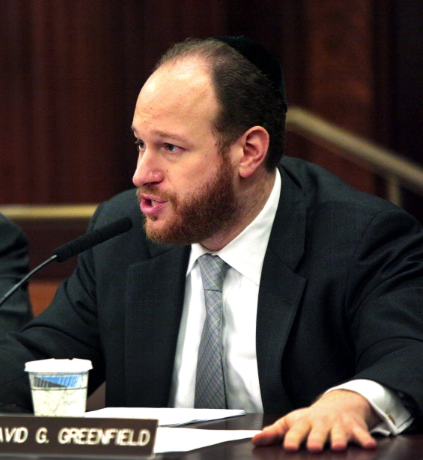 At the NYC Council
At the NYC Council
And I realized that for me, that’s a way where I can make the most difference, which is through public policy and government politics and trying to help the community. And so the point that I’m making is that you need to really ask yourself and check in with yourself the way that I’m doing it right now with my team, which is, are we where we want to be? Is this where we’re headed? Did we accidentally end up somewhere else.
I even told my staff something very controversial. I said, look, if there’s something that we do that is okay, and we’re doing it pretty well and we’re making a difference, but we think we could use those resources in a different way, let’s consider putting that on the chopping block. I want to be clear, not something that we’re losing money on, not something that we’re not doing well on, just that there’s a limited amount of time and effort during the day. And sometimes you have to trade things that are good for things that are going to be great. And that’s what I told my staff last week, and I expect them to come back to me and tell me, look, these things are good, but if we didn’t do this, we could probably do something else that was great.
It’s very easy to just get stuck in the things that are good and forget that what you really wanted to do initially was something that was great.
Once again, these are programs that work, that are good, where we provide good services, and it’s helping us in terms of our bottom line. But that’s not what we’re in this for. We’re not here to do a good job. If other people are doing it, that’s great. Let them do it, and let us focus on things that are out of the box and really are game changers in a way that’s very significant.
Wow.
And that’s actually what I really tried to do when I came into Met Council as an organization. The organization was $7 million in the red and it was difficult time. And we decided, with the support of my board of directors, that we were going to focus on really a handful of things, and part of it was really understanding what our priorities are.
So we decided that food would be very important, holocaust survivors are very important, that victims of domestic violence would be important, and that the quality of our housing would be very important as well. And that’s really what I focused on from a programmatic perspective.
And the food program, when I came in, we were distributing approximately 5 million pounds of food. Last year, we gave out 22 million pounds of food. It’s not just the quantity of the food, it’s also the quality of the food. We’re giving out higher quality food we’ve ever given out before, and we literally have increased our distribution and our impact and our quality by 500%. Just this Rosh Hashana alone, we’re going to be doing 171 locations that we’re giving out food in the tri state area; New York, New Jersey, and Connecticut. We never even given out beyond New York City. We’re now doing upstate new York, Long Island, New Jersey, & Connecticut.
So we’re really making a meaningful impact in terms of the work that we’re doing. Similarly, in the Holocaust Survivor program, which I think I already mentioned, we really triple down on the program and focused on staff that have the expertise to deal with folks that have trauma, because if you have trauma from the Holocaust, it lasts your entire life. And the people that we’re dealing with, in many cases are low-income. And so, unfortunately, they’re struggling as survivors. It’s interesting, there was a study that said that in Israel that survivors on average live ten years longer than non survivors. There’s something about the fact that they survive, so they’re living longer. They don’t have the resources, unfortunately, in some cases. And so we really doubled down on how we can be helpful to them and how we can make a difference. And we’ve increased that program by 400%. And we’re serving over 2,000 Holocaust survivors now in the New York area in a whole variety of ways.
Similarly, on the domestic violence front, we really decided it was important for us to have a footprint in all five boroughs for anyone from the community who had an issue and was a victim. And so we’re the only Jewish organization now that’s in all five criminal justice centers, which essentially are these agencies as part of the city where people who are victims of domestic violence can come and they can choose to work with Met Council as a Jewish organization, get the culturally appropriate work that they need.
And on the housing side, we really invested a lot of time and resources ensuring that the housing stock is quality. And I think this is something that people don’t understand and realize, right? We own hundreds of millions of dollars worth of real estate in New York City. We own over 20 buildings that we operate and manage, as well. And the quality of the housing is very important. So I came up with a plan to really invest tens of millions of dollars, which we’ve done, into these buildings, to ensure that they are quality buildings. There’s no chochma giving someone affordable housing if it looks like some of the public housing that we see. Unfortunately, you look at some buildings that are literally falling apart.
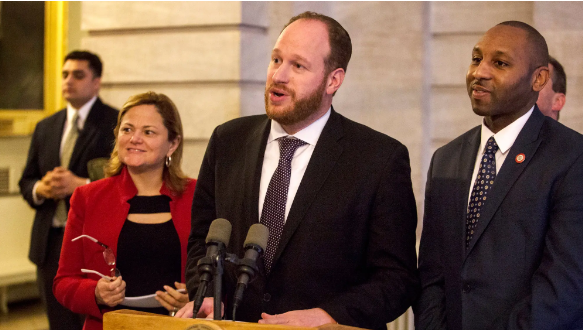 Handing off his nomination to his NYC Council seat to assume his new role at Met Council
Handing off his nomination to his NYC Council seat to assume his new role at Met Council
At Met Council, a lot of people don’t know this, but we’re the largest owner and operator of senior affordable housing in the Jewish community. The reason that we don’t advertise it is because we have a long waitlist for these buildings. Because everybody wants to live in them. Our average rent is $410 per month for a one-bedroom apartment, which includes utilities in a doorman-appointed building. So there’s a long waitlist for them, so it doesn’t get as much publicity. But despite that, it was important for me to make sure that the housing that we own at Met Council, that we manage these hundreds of millions of dollars worth of property, that we ensure that it is great for the next generation. And so I ended up securing and raising tens of millions of dollars to really invest in these housing buildings that we own across the five boroughs to ensure that they are modernized and up to date and that they’re in great condition. And you’d be proud to have any one of your relatives, your aunt or uncle, father or grandfather, live there because they really are beautiful buildings.
The most amazing thing about that is I had a council member who came to me a couple of years ago, and he was upset at me. He said, David, you know, I’m very angry. I said, what are you talking about? He said, you know, you have a program where you let us volunteer to deliver food to seniors who are in need. And I went into this beautiful building and I gave food to the senior, and they had a beautiful apartment and what are you doing, David? Why am I giving food to people who don’t need it? I said, where did you go? And he said, I went to this building on the Upper East Side. And I said, yeah, we own that building, and it’s in your district. So what do you mean, it looks like any other building? See, that’s the whole point. Well, there’s a doorman, he said. Yes, that’s the idea. He said, So that’s your building? Yeah. He said, but everybody looks great. I said, yes, that’s the whole idea of dignity.
I said, seniors who live there, they pay $410 a month in rent. They live in a building. It looks like any other building on the Upper East Side. And yes, Baruch Hashem, they live in a beautiful building with a doorman, and they have nice furniture, and they’re able to live there. How could they live? They’re on fixed incomes. That person’s entire income is $1,000 a month, right? He’s like, wow, I apologize. I didn’t realize. I thought I was delivering food to rich people. I was like, you certainly were not. I think that’s the point, which is that when you’re entrusted—it sounds bizarre, but to me—it’s a responsibility. There’s over 1,100 people who live in our buildings, and these are seniors who are low income who rely on us. It was important to me to make sure that we’re investing in these buildings and that we ensure the quality of these buildings. And we have done that over the last six years since I took over Met Council as well. So those were really our four very important themes in terms of services.
Wow, David. It was fascinating to learn of the changes you’ve made to the Met Council over the past six years, especially in these 4 key areas!
I was fascinated by what you said about your speech that went viral with tens of millions of views, and that you attribute that to focus—which is something our readers are after—and to the fact that your whole life had been leading up to that moment. And when you focus on something and keep working at it until you’re an expert, your moment will come. And that’s how you went viral!
Your grandfather is certainly an inspiration with the food, water, and toothbrushes he gave out during the Holocaust, risking his life for other people and that gives you a sense of achrayus to protect, cherish and respect the survivors that are out there. You also mentioned your mother who would prepare food and deliver it to people in the community who were in need, as well as your father who spent hundreds of hours helping strangers with advice so they could be success in their businesses. So all 3 had a great impact on you.
Also of interest was your notion back then of a lawyer as someone who upheld truth and justice and differentiated right from wrong and being very committed to that goal, until you decided right after your fathers passing that you were going to change your career, choosing to focus on what you wanted to do, which is to try to make a difference on behalf of people in the community.
Thank you very much for sharing all that personal information with our readership, David! Theres so much that we can still learn, and I hope we can schedule a part 2 to this interview. Until then, be well and may you continue in your impactful work on behalf of our communities for many more years to come with health and prosperity!
K’siva V’chasima Tova!
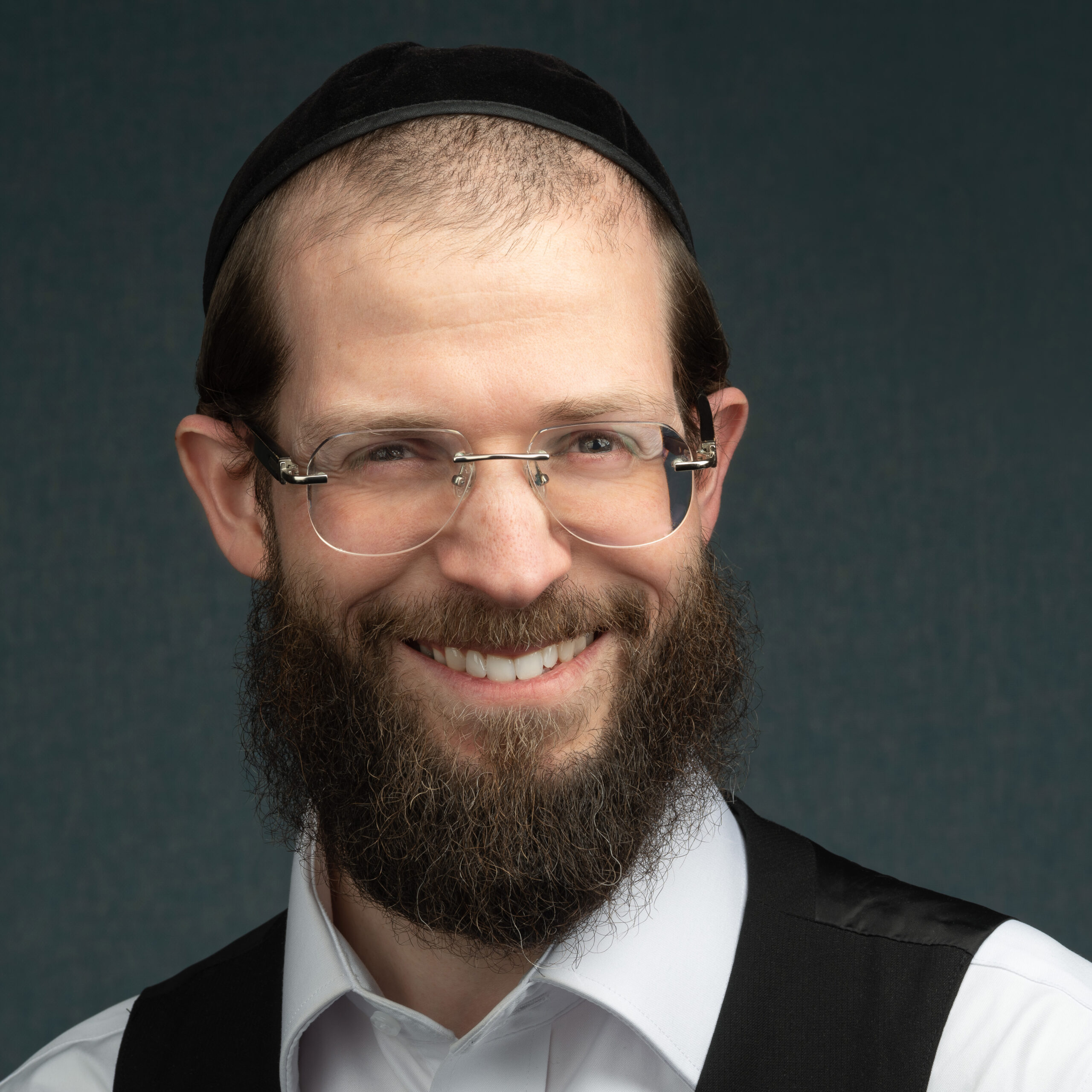
Zevy Lamm
As the leader of a super-strong team of NYC permit consultants, I needed to learn how to achieve more. I spent lots of time and money learning from the best mentors. To hear more about some of my personal challenges and successes, click here. Today I’m really proud of what we’ve accomplished as a team & as a company B”H! That’s why I launched JSuccess to help other achievers in our community achieve more too!
We’d love to hear from you!
If you have any thoughts, takeaways, questions, or comments, please share them with us and we’ll do what we can to have the expert address your message in next month’s edition! As an added bonus, if you’re a paid member, you can share your company name and your position, and the expert will include that when addressing your point!
